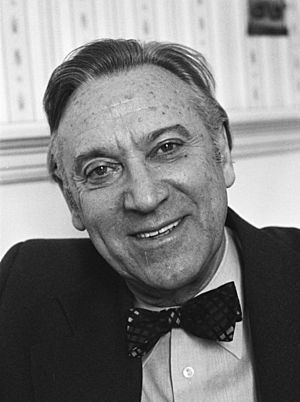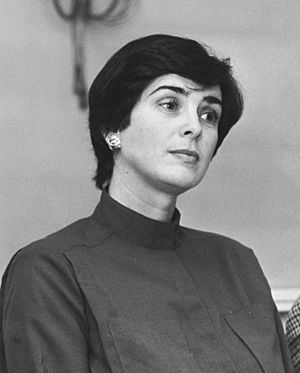Kirill Kondrashin facts for kids
Kirill Petrovich Kondrashin (born March 6, 1914 – died March 7, 1981) was a famous conductor from the Soviet Union (now Russia). A conductor is someone who leads an orchestra or choir. He was known for his amazing musical talent. He even earned the title of People's Artist of the USSR, which is a very high honor for artists in the Soviet Union.
Contents
Kirill Kondrashin's Early Life
Kirill Kondrashin was born in Moscow, a big city in Russia. His parents were both musicians in an orchestra. Because of this, he spent a lot of time watching rehearsals. By the age of 14, he knew he wanted to be a conductor.
He studied music at the Moscow Conservatory from 1931 to 1936. His teacher was a conductor named Boris Khaikin. Kirill started conducting at the Young People's Theatre in Moscow in 1931. Later, he worked at the Stanislavsky and Nemirovich-Danchenko Moscow Academic Music Theatre.
From 1938 to 1942, he conducted at the Maly Opera Theatre in Leningrad. Then, in 1943, he moved to the famous Bolshoi Theatre in Moscow. He conducted Shostakovich's Symphony No.1. This performance caught the composer's attention. It led to a strong friendship between them. In 1947, Kirill Kondrashin received the Stalin Prize.
Main Career and Famous Performances
In 1958, Kirill Kondrashin was a conductor for the first International Tchaikovsky Competition. He worked with the American pianist Van Cliburn. Van Cliburn won first prize in the competition. After this, Kondrashin and Cliburn toured the United States. Kondrashin was the first Soviet conductor to visit America since the start of the Cold War. The Cold War was a time of tension between the Soviet Union and the United States.
They performed and recorded two famous piano concertos. These were the Rachmaninoff Piano Concerto No.3 and the Tchaikovsky Piano Concerto No.1. Millions of their recordings were sold in America. Their Tchaikovsky recording was the first classical music album to sell one million copies.
Later, in 1972, Cliburn and Kondrashin played together again. They performed Brahms's Piano Concerto No. 2 with the Moscow Philharmonic. This concert was recorded and released years later.
Kondrashin was also the main conductor for the Moscow Philharmonic Orchestra. He held this position from 1960 to 1975. During this time, he conducted the first performances of two of Shostakovich's symphonies. These were Symphony No.4 in 1961 and No.13 in 1962. He also performed in Europe and America. He worked with other famous Russian musicians like Rostropovich, Oistrakh, and Richter.
Life in Western Europe
In December 1978, Kirill Kondrashin was on tour in the Netherlands. He decided to stay there and not return to the Soviet Union. He asked for permission to live in the Netherlands. After he left, the Soviet government stopped all his recordings from being sold.
He became the main guest conductor for Amsterdam's Concertgebouw Orchestra in 1978. He stayed in this role until he passed away. He also worked with the Vienna Philharmonic for a short but successful time.
In the Netherlands, he married Nolda Broekstra. She was a music expert and helped him as an interpreter. Kirill Kondrashin passed away in Amsterdam in early 1981. He died from a heart attack. This happened on the same day he conducted Mahler's First Symphony. He was conducting with the North German Radio Symphony Orchestra.
Recordings of some of Kondrashin's live concerts were released. These included exciting performances of symphonies by Shostakovich. In one recording, you can even hear him tapping his foot as he conducts the lively final part of Shostakovich's Sixth Symphony.
Awards and Honors
Kirill Kondrashin received many awards for his musical achievements:
- Stalin Prize, first class (1948) – for conducting the opera "Evil Force"
- Stalin Prize, second class (1949) – for conducting the opera The Bartered Bride
- Honored Artist of the RSFSR (1951)
- Grammy Award (1960)
- People's Artist of the RSFSR (1965)
- Glinka State Prize of the RSFSR (1969)
- People's Artist of the USSR (1972)
- Order of the October Revolution (1974)
- Order of the Red Banner of Labour
- Order of Friendship of Peoples (1976)
See also
In Spanish: Kiril Kondrashin para niños
 | Delilah Pierce |
 | Gordon Parks |
 | Augusta Savage |
 | Charles Ethan Porter |



